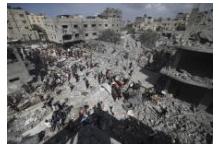MSF’s Ongoing Response To The Violence In Gaza And Israel
, Medecins Sans Frontieres AustraliaMSF is devastated by the recent events in Gaza. Our teams have shared the following updates.
*Contributions to MSF are directed to our general emergency fund, which is what we draw upon to deliver lifesaving healthcare wherever the needs are greatest.
We want to ensure we are accountable and using your gift where you intend, so please contact us if you would like to support Gaza directly.*
“What our staff are dealing with on the ground is beyond anything that any medical organisation or individual could handle.” – Jennifer Tierney, MSF executive director, Australia and New Zealand.
MSF calls for immediate enduring cessation of the indiscriminate bloodshed. Thousands have been killed or injured, hospitals have been destroyed. MSF calls for a permanent lifting of the blockade, allowing essential supplies like food, water, medicine and fuel to cross into Gaza. MSF also calls for the protection of civilians and healthcare facilities on both sides, at all times.
AS OF NOVEMBER 22
The unrelenting assault on Gaza’s hospitals has intensified. The horrors unfolding in Gaza clearly shows that calls for adherence to the International Humanitarian Law have been blatantly ignored.
Many Palestinian MSF staff are continuing to work across the Gaza Strip, providing lifesaving humanitarian care and assisting hundreds of patients. They face significant risks because even basic protections for hospitals and medical personnel are not guaranteed.
MSF-supported Al-Awda hospital in the north of Gaza was one of the last remaining functional hospitals in northern Gaza. It was attacked on 21 November, killing two MSF doctors and a third doctor. Other medical staff, including MSF staff, were severely injured. MSF routinely shared information about Al Awda as a functioning hospital and the presence of its staff to warring parties.
More than 200 patients are still at the hospital, unable to receive the level of care they need. All hospitals in Gaza have been working beyond their capacity since October due to ongoing supply shortages, attacks on facilities and extremely high numbers of patients.
This is just a small snapshot of the events happening in Gaza right now. In the south, MSF teams have resumed work in Nasser hospital, responding to mass casualty events.
On 18 November, 122 patients arrived at the hospital in the immediate aftermath of an Israeli airstrike, one kilometer from the hospital. While 70 people were dead upon arrival, dozens of injured people, including many children, arrived in critical condition with severe burns.
In the burn unit, where MSF works, surgeons are doing around 10 burn surgeries a day. But the hospital is overflowing with hundreds of patients with burns who must wait for surgical care.
“The medical needs are huge, and MSF is ready to scaleup its activities, but we need basic guarantees of safety and unrestricted access of medical and humanitarian supplies into Gaza," said Christophe Garnier, MSF project coordinator in southern Gaza. "A ceasefire is a must, now more than ever, to stop the bloodshed that is happening.”
No one in Gaza can go on like this. A humanitarian pause is not enough. An immediate enduring ceasefire is the only option to spare the lives of Gazans, lift the blockade and restore the flow of humanitarian aid on which the survival of the population of Gaza depends. We are calling on all parties to ensure the safety of civilians and medical facilities.
MSF WORKING IN PALESTINE
We began working in Palestine in 1989. We have run medical programs in Gaza for more than 20 years, and provided 137,000 outpatient consultations in 2022.
Prior to the conflict we were offering comprehensive care for people suffering from burns and trauma, including surgery, physiotherapy, psychological support and occupational therapy. MSF’s projects were crucial because Gaza’s national healthcare system is overstretched, underfunded and has been deeply impacted by over a decade of blockade.
MSF is an independent, neutral, and impartial organisation. We run our programs in Palestine to address huge, unmet medical-humanitarian needs. We do not run medical programs in Israel because it has strong emergency and health services.
We have offered support to Israeli hospitals treating casualties both during this war and in previous escalations. To date they have respectfully declined our offers.
Our reporting is rooted in the direct witnessing of our staff and the people that we treat in our facilities in the West Bank and Gaza Strip.
We are calling for your support for our immediate and long-term response to help people affected by the war.
TO KEEP UPDATED ON MSF‘S WORK IN PALESTINE, VISIT OUR WEBSITE — https://msf.org.au/issue/gaza-israel-war
